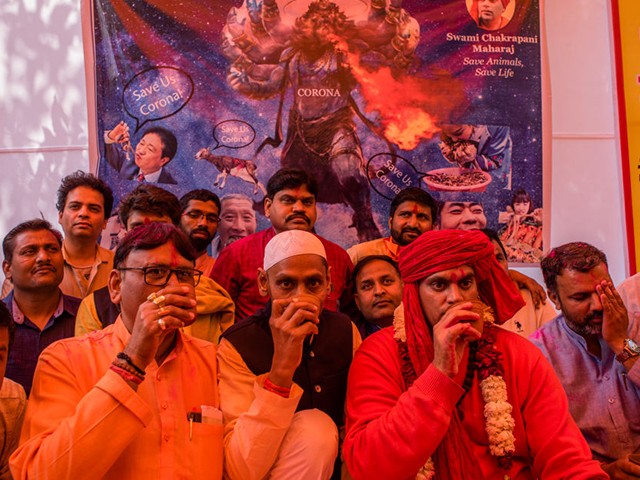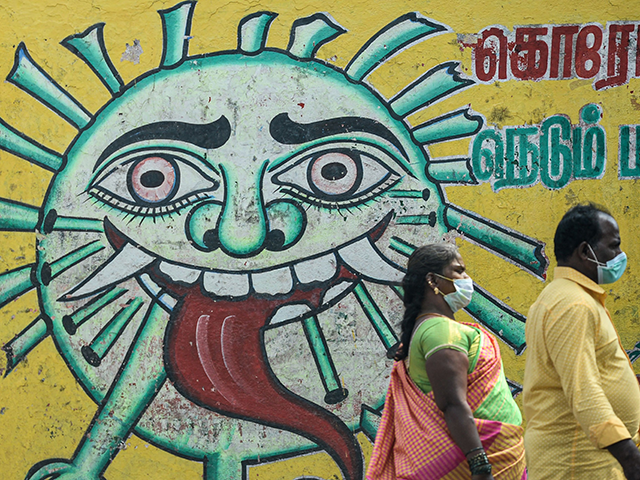India’s Supreme Court has yet to receive data showing that individuals unvaccinated against the Chinese coronavirus pose a higher risk of transmission of the disease than people who are vaccinated against it, the top Indian court stated in a ruling on vaccine mandates issued on Monday, the Indian Express reported on Tuesday.
The Indian newspaper relayed on May 3 excerpts of the Indian Supreme Court ruling published on May 2, writing:
On vaccine mandates, the court said that “no data has been placed by the Union of India or the states appearing before us, controverting the material placed by the petitioner in the form of emerging scientific opinion which appears to indicate that the risk of transmission of the virus from unvaccinated individuals is almost on par with that from vaccinated persons”
[…]
and therefore, the “various vaccine mandates by state governments / Union territories cannot be said to be proportionate.”
The Indian Supreme Court issued its judgment on May 2 in response to a petition filed by Dr. Jacob Puliyel, a former member of India’s National Technical Advisory Group on Immunisation (NTAGI). Dr. Puliyel filed the petition to seek the public disclosure of Chinese coronavirus vaccine trial data and a stay on Chinese coronavirus vaccine mandates within India.
India’s top court said on Monday it supported a “review” of existing Chinese coronavirus vaccine mandates within Indian state governments and federally administered territories. Indian Supreme Court Justices L. Nageswara Rao and B. R. Gavai wrote the following in their May 2 verdict:
Till the infection rate remains low and any new development or research finding emerges which provides due justification to impose reasonable and proportionate restrictions on the rights of unvaccinated individuals, we suggest that all authorities in this country, including private organisations and educational institutions, review the relevant orders and instructions imposing restrictions on unvaccinated individuals in terms of access to public places, services and resources, if not already recalled.
The verdict further stated that while people in India cannot be forcibly vaccinated against the Chinese coronavirus, the Indian federal government may, in certain circumstances, limit individual freedoms during a public health crisis such as the Chinese coronavirus pandemic. The Times of India relayed this section of the verdict on May 3, writing:
“Persons who are keen to not be vaccinated on account of personal beliefs or preferences, can avoid vaccination, without anyone physically compelling them to be vaccinated.
However, if there is a likelihood of such individuals spreading the infection to other people or contributing to mutation of the virus or burdening of the public health infrastructure, thereby affecting communitarian health at large, protection of which is undoubtedly a legitimate state aim of paramount significance in this collective battle against the pandemic, the government can regulate such public health concerns by imposing certain limitations on individual rights that are reasonable and proportionate to the object sought to be fulfilled.”
The U.S. Centers for Disease Control and Prevention (CDC) states the following on its website regarding Chinese coronavirus vaccines and their effect on the disease’s transmissibility:
The risk for SARS-CoV-2 infection in fully vaccinated people cannot be completely eliminated as long as there is continued community transmission of the virus. Early data suggest infections in fully vaccinated persons are more commonly observed with the Delta variant than with other SARS-CoV-2 variants.
However, data show fully vaccinated persons are less likely than unvaccinated persons to acquire SARS-CoV-2, and infections with the Delta variant in fully vaccinated persons are associated with less severe clinical outcomes.
Infections with the Delta variant in vaccinated persons potentially have reduced transmissibility than infections in unvaccinated persons, although additional studies are needed.
SARS-CoV-2 is the name of a type of coronavirus that causes a disease named “Covid-19,” alternatively known as the Chinese coronavirus.
The federal government of India announced on January 30 that it had administered “at least two vaccines against COVID-19 [Chinese coronavirus] to 75% of its adult population,” Germany’s Deutsche Welle broadcaster reported at the time. India is home to an estimated 1.38 billion people, which is the world’s second-largest population after China.
“India has approved nine Covid [Chinese coronavirus] vaccines, five of which have been locally made. Only two have been widely used,” the BBC reported on April 26.
“India is currently using four vaccines — Covishield, Covaxin, Sputnik V and Corbevax — for its drive. Of these, Covishield accounts for over 81% of the doses given so far,” the British broadcaster observed at the time.
Covishield is the Indian iteration of AstraZeneca’s Chinese coronavirus vaccine, which it developed jointly with Oxford University. The Serum Institute of India manufactures Covishield for use in India on behalf of AstraZeneca, which is a British-Swedish multinational pharmaceutical company. The vaccine gained World Health Organization (W.H.O.) emergency use approval in February 2021.

President Chakrapani Maharaj (in orange Turban) of ‘Akhil Bharat Hindu Mahasabha’ (ABHM) a Hindu organisation, along with other members, drinks a cup of cow urine, during a ‘gaumutra (cow urine) party’ to fight against the spread of the COVID-19 coronavirus on March 14, 2020 in New Delhi, India. ( Yawar Nazir/Getty Images)
The Indian firm Bharat Biotech produces Covaxin. It became the first Chinese coronavirus vaccine entirely developed and manufactured in India to receive W.H.O. emergency use approval in November 2021.
“Covishield is made from a weakened version of a common cold virus (known as an adenovirus) from chimpanzees. It has been modified to look more like coronavirus — although it can’t cause illness,” according to the BBC.
Covaxin is based on a traditional “inactivated” vaccine technology that utilizes a dead version of a germ that causes a disease to stimulate an immune response in its recipient.
Bharat Biotech estimates Covishield’s efficacy at about 78 percent, while the W.H.O. states the following about the “Oxford/AstraZeneca COVID-19 vaccine”: “The vaccine efficacy against symptomatic SARS-CoV-2 infection was 76%. But this is specific to events from 15 days past second dose, with an inter dose interval of 29 days.”
The W.H.O. stated on March 16 that Covaxin’s “efficacy against COVID-19 [Chinese coronavirus] of any severity, 14 or more days post dose 2, was 78%. Vaccine efficacy against severe disease is 93%.

COMMENTS
Please let us know if you're having issues with commenting.